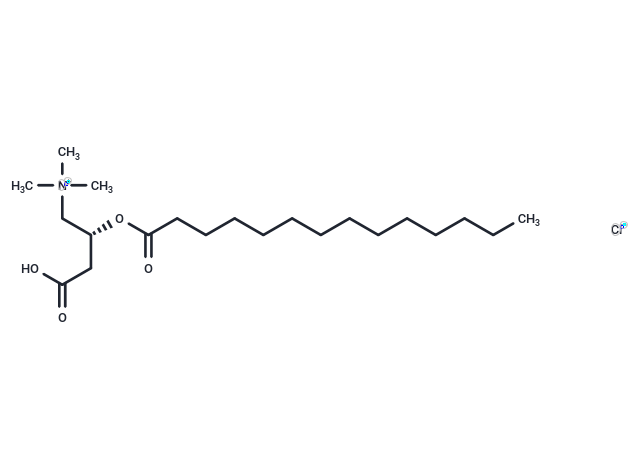
Myristoyl-L-carnitine chloride
CAS No. 173686-73-2
Myristoyl-L-carnitine chloride( —— )
Catalog No. M34939 CAS No. 173686-73-2
Myristoyl-L-carnitine chloride (L-Myristoylcarnitine chloride) is one of the body's metabolites implicated in inherited metabolic disorders.Tetradecanoylcarnitine is a potential marker for the study of diabetes mellitus and autoimmune hepatitis.
Purity : >98% (HPLC)
 COA
COA
 Datasheet
Datasheet
 HNMR
HNMR
 HPLC
HPLC
 MSDS
MSDS
 Handing Instructions
Handing Instructions
| Size | Price / USD | Stock | Quantity |
| 500MG | Get Quote | Get Quote |


|
| 1G | Get Quote | Get Quote |


|
Biological Information
-
Product NameMyristoyl-L-carnitine chloride
-
NoteResearch use only, not for human use.
-
Brief DescriptionMyristoyl-L-carnitine chloride (L-Myristoylcarnitine chloride) is one of the body's metabolites implicated in inherited metabolic disorders.Tetradecanoylcarnitine is a potential marker for the study of diabetes mellitus and autoimmune hepatitis.
-
DescriptionMyristoyl-L-Carnitine Chloride is a natural long-chain glycoline, amino acid derivative.
-
In Vitro——
-
In Vivo——
-
Synonyms——
-
PathwayOthers
-
TargetOther Targets
-
RecptorOthers
-
Research Area——
-
Indication——
Chemical Information
-
CAS Number173686-73-2
-
Formula Weight408.015
-
Molecular FormulaC21H42ClNO4
-
Purity>98% (HPLC)
-
Solubility——
-
SMILES[C@H](OC(CCCCCCCCCCCCC)=O)(C[N+](C)(C)C)CC(O)=O.[Cl-]
-
Chemical Name——
Shipping & Storage Information
-
Storage(-20℃)
-
ShippingWith Ice Pack
-
Stability≥ 2 years
Reference
1. Stephanie E Reuter, et al. Impact of haemodialysis on individual endogenous plasma acylcarnitine concentrations in end-stage renal disease. Ann Clin Biochem. 2005 Sep;42(Pt 5):387-93.??
molnova catalog



related products
-
Laminin 925-933
Laminin 925-933 is a peptide derived from residues 925-933 of the laminin B1 chain that binds to the laminin receptor.
-
α-Tocopherol phospha...
α-Tocopherol phosphate (alpha-Tocopherol phosphate) is an antioxidant that scavenges UVA1-induced reactive oxygen species (ROS) and protects against long-wave UVA1-induced cell death.
-
2-amino-4-methyl-1,3...
2-amino-4-methyl-1,3-thiazole-5-carbohydrazide is a compound used as a molecular building block.



 Cart
Cart
 sales@molnova.com
sales@molnova.com


